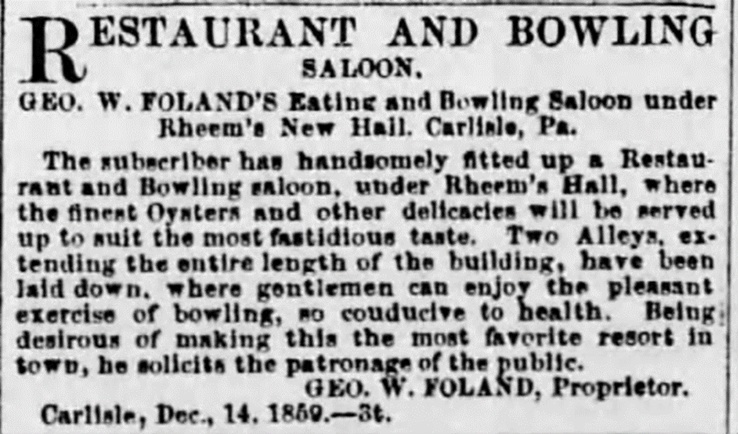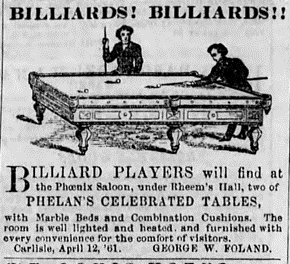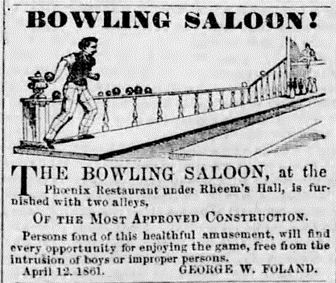In August 1859, Jacob Rheem held the Grand Opening of his new Hall in Carlisle located behind the Courthouse on Courthouse Avenue. According to a description in the newspaper, the basement in the three-story building was well ventilated and airy, and suited for a restaurant, a bowling saloon, and a barber shop. The first floor was divided into four offices in the front with two large rooms in the rear suitable for a business. The main entrance opened to a vestibule with two stairways leading to the concert room/hall on the second floor. The room was 75 feet by 50 feet with a height of 18 feet. It could seat about 800 people and was fitted up with a stage with dressing rooms on each side. The third floor was divided into meeting rooms for Lodges or Societies.1
In December 1859, four months after the Grand Opening, George W. Foland proudly announced that he had fitted up a Restaurant and Bowling Saloon under Rheem’s Hall. He proclaimed that “the finest oysters and other delicacies will be served up to suit the most fastidious taste. Two Alleys, extending the entire length of the building, have been laid down,” he stated, “where gentlemen can enjoy the pleasant exercise of bowling, so conducive to health.” 2

A month later Rheem’s Hall caught fire. Although the building was saved, Foland sustained “severe” losses.
The American Volunteer printed the following account of the incident.
On Sunday morning last, January 15, 1860 about an hour before daybreak, our citizens were roused from their slumbers by the cry of fire. It was soon ascertained that the interior of RHEEM’S elegant new Hall was in a blaze from the cellar to the roof. The ground floor was occupied by Mr. George Foland, who kept a restaurant and ten-pin alley. The fire, it is supposed, originated here, and flames ascended rapidly up the stairway to the third story. The rooms on the first floor, above ground, were occupied by Messrs. Penrose, Ruby and Rhoads, attorneys, John Wolf, barber, Geo. Hendel’s billiard tables, and John D. Gorgas’ stove ware-room. Most of the property belonging to these gentlemen were carefully removed and saved, except the billiard tables belonging to Mr. Hendel. The building, with the exception of two or three rooms, is nearly burned out. Mr. Rheem, we are glad to learn, is insured in the Lycoming Insurance Company, to the amount of $3,000. This will not cover the loss, however. Some think the fire was the work of an incendiary, but this is doubtful.3
The Carlisle Herald noted: “Mr. George Foland sustains a severe loss by this fire; he had just fitted up and established a neat restaurant and bowling alley in which he invested his all, and the good order with which he conducted it made it a very agreeable resort. We hope however, that his friends will step forward, in this emergency, and assist him in taking a “fresh start.”4
Foland was back in business at Rheem’s Hall by August 1860, and “he had recently introduced another first class premium Billiard table with marble bed, and improved cushions,” in his Billiard Room.5 In October he opened a “Ladies Restaurant” in the basement where gentlemen could take ladies for oysters. It was “handsomely fitted and divided into small boxes to secure privacy for small parties with an exclusive entrance, and entirely shut out from the public rooms, the billiard and bowling saloons.” 6

Carlisle Herald advertisement April 12, 1861

Foland promised that patrons could enjoy bowling “free from the intrusion of boys or improper persons.” Carlisle Herald, April 12, 1861
George W. Foland was born in Darmstadt, Germany in 1829. He was the son of George and Elizabeth Foland who emigrated to Baltimore in 1832. By1838 they were living in Carlisle where his father was naturalized in November 1840.7
George W. was unmarried and living at home in 1850. By 1851 he was in the business of selling liquor. He opened his restaurant and bowling alley in 1859, and the 1860 census recorded his occupation as a 31-year-old saloon keeper living with his 21-year-old wife Catharine and two domestic servants who were likely employed in the bowling alley or restaurant.
A U. S. Civil War Draft Registration, taken on June 3, 1863, recorded George W. Foland of Carlisle as a married man aged 34 years old, whose occupation was given as a tobacconist. In the Remarks column was written, “No palate.” 8 Reminiscing in his “Old Home Week Letters,” Charles H. Leeds wrote, “Don’t you [remember] George Foland, and the difficulty he experienced by the loss of his palate?” 9
The Spring of 1864 was the last time Foland was taxed for Billiard tables, and he disappears from local records.



